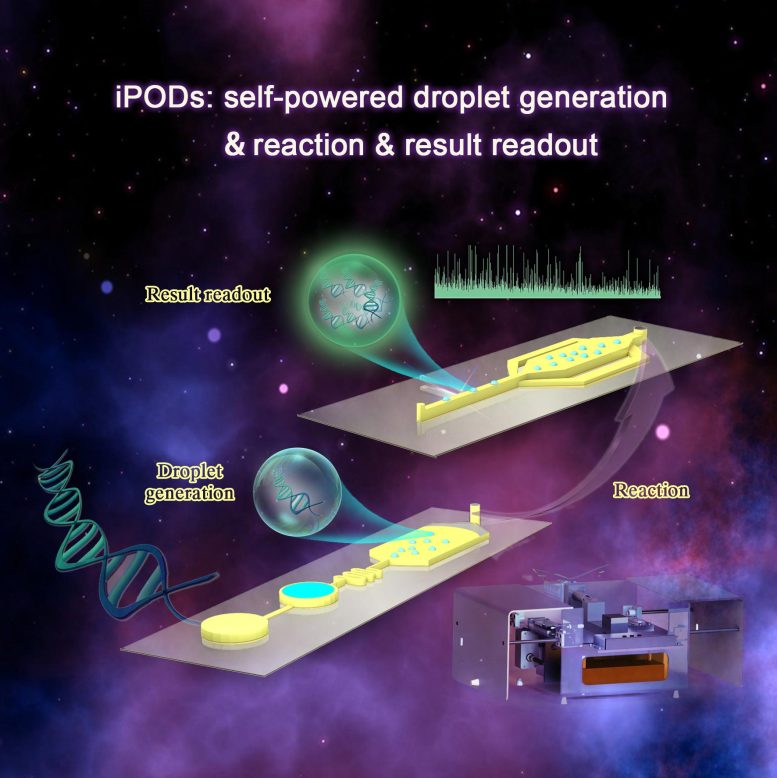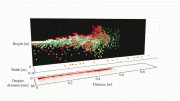
iPODs for portable integrated droplet applications. Developed by researchers at the Qingdao Institute of Bioenergy and Bioprocess Technology, iPODs uses an auto flow-focusing droplet reinjection chip to eliminate the need for external pumps and precise fluid control in droplet microfluidics testing. This enables portability, lower costs, and user-friendly droplet analysis. Credit: Yang Liu
The Integrated Portable Droplets system (iPODs) device offers a portable, affordable, and user-friendly droplet analysis system for rapid-results testing with strong accuracy in detecting and quantifying bacterial species.
Rapid-results testing has become an increasingly important part of our fast-paced world. Utilizing droplet microfluidics allows for quicker point-of-care testing (POCT) but is not always as accurate, and currently requires an amount of external effort for proper handling.
The Integrated Portable Droplets system, or iPODs, developed by researchers from the Single-Cell Center at Qingdao Institute of Bioenergy and Bioprocess Technology (QIBEBT) of the Chinese Academy of Sciences (CAS), is based on an auto flow-focusing droplet reinjection chip that eliminates the need for external pumps and precise fluid control, allowing for portability, lower costs, and a user-friendly method of droplet analysis.
The study was published recently in the journal Analytical Chemistry.
The researchers found the results to be promising: the automated style in which the droplets transfer through the instrument reduces the need for manual operation, therefore reducing the chance of error, cross-contamination, and sample loss.
They also found a strong linearity of samples measured between 101 to 104 copies of bacteria per microliter with an R2 value of 0.999. The closer an R2 value is to 1, the better the line is able to visually represent how well the iPODs device (the independent variable) can detect and quantify the bacterial species present in the sample (the dependent variable).
Additionally, the device cost and subsequent cost of each use are reasonable enough to be affordable on a large scale. Another unique and important aspect of the device is its portability which allows for the device to be used in a broader setting, such as outdoor settings or decentralized labs.
“In previous reports, droplet reinjection undoubtedly requires precise fluid control, thereby reducing the portability of the device, more seriously, restricting the development of droplet-based nucleic acid amplification testing for POCT,” said LIU Fengyi, a doctoral student and first author of the study. “Here we showed this droplet reinjection chip greatly simplified the experimental setup and operation procedure with low device cost and low reagent consumption.”
Droplet microfluidic testing consists of taking a small amount of fluid for testing, which often features cell manipulation and single-cell or single-molecule analysis. One issue iPODs address is the relatively low quantitative detection levels of loop-mediated isothermal amplification (LAMP) when done in bulk, which just gives an “all or nothing” result.
Droplet digital LAMP with iPODs makes it highly sensitive and accurate in assessing quantities of nucleic acids present in the sample. The downside to this is the need for precise fluid control and external pumps, all of which reduce portability and increase costs. “We present a droplet reinjection method capable of droplet distribution without precise fluid control and external pumps, by which the droplets can be passively aligned and detected one by one at intervals,” said GE Anle, contributing author and assistant research fellow.
Using iPODs, the external pump and the need for precise fluid control are eliminated due to the integration of the droplet generator, heating tool, and fluorescent signal reader all packaged in a small, retractable box.
In order for this technology to reach its full potential, some adjustments will be needed in the future, such as improving the stability of the system, and implanting of thermal cycling modules for droplet digital PCR (ddPCR). Further implantation with other cheap chip materials for large standardized production, as well as the introduction of fully automated operation processes, will make the system more user-friendly.
“Once the device is fully developed, we hope to see the technology used in a wide array of applications, from biochemical testing at a point-of-care level to in a more clinical research-based setting,” said corresponding author Prof. MA Bo, from Single-Cell Center.
Reference: “Auto Flow-Focusing Droplet Reinjection Chip-Based Integrated Portable Droplet System (iPODs)” by Fengyi Liu, Anle Ge, Chunyu Li, Wei Gao, Fei Wu, Lingyan Kan, Jian Xu and Bo Ma, 13 April 2023, Analytical Chemistry.
DOI: 10.1021/acs.analchem.3c00239









Be the first to comment on "iPODs Transforms Microfluidic Testing for a Faster, Portable Future"